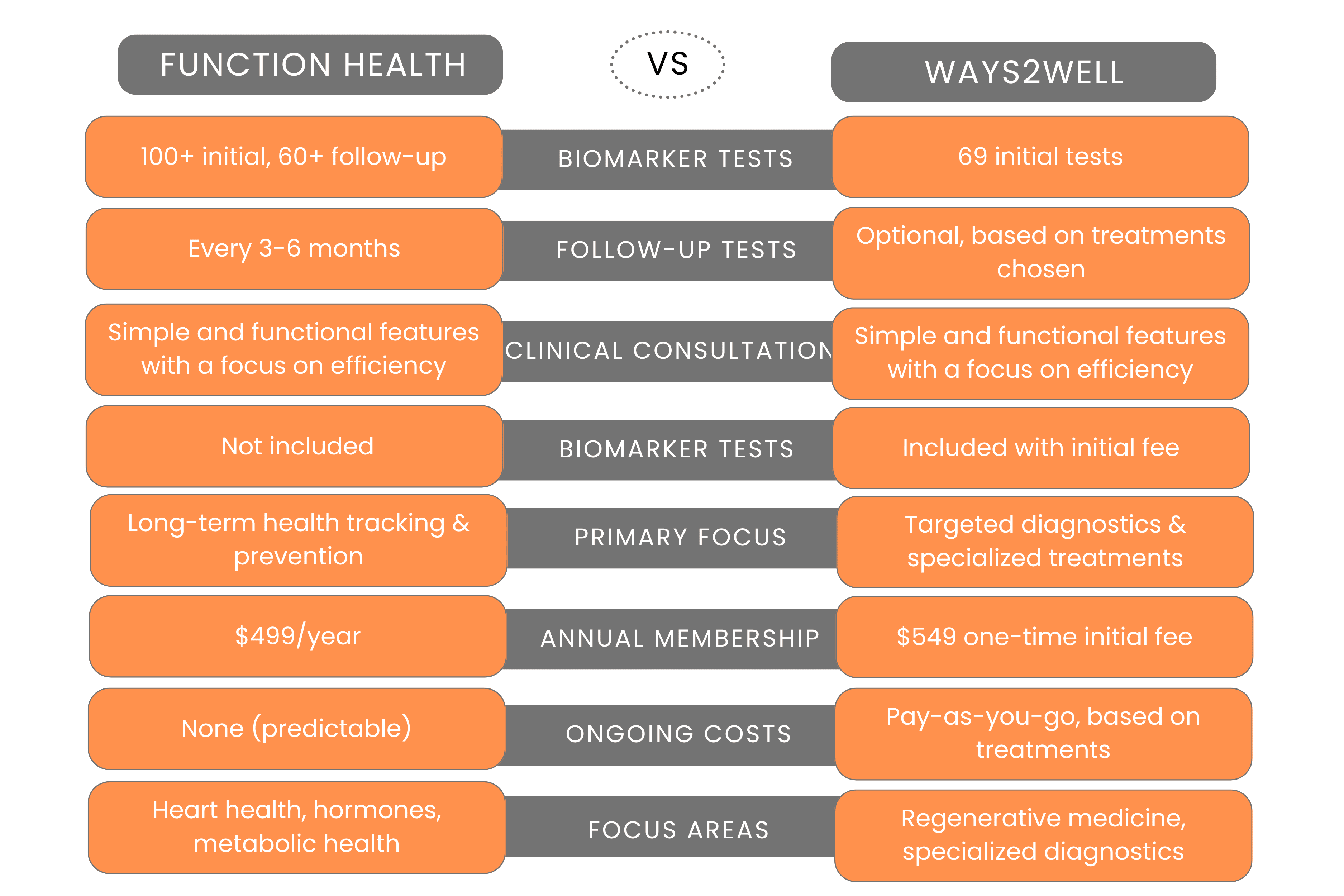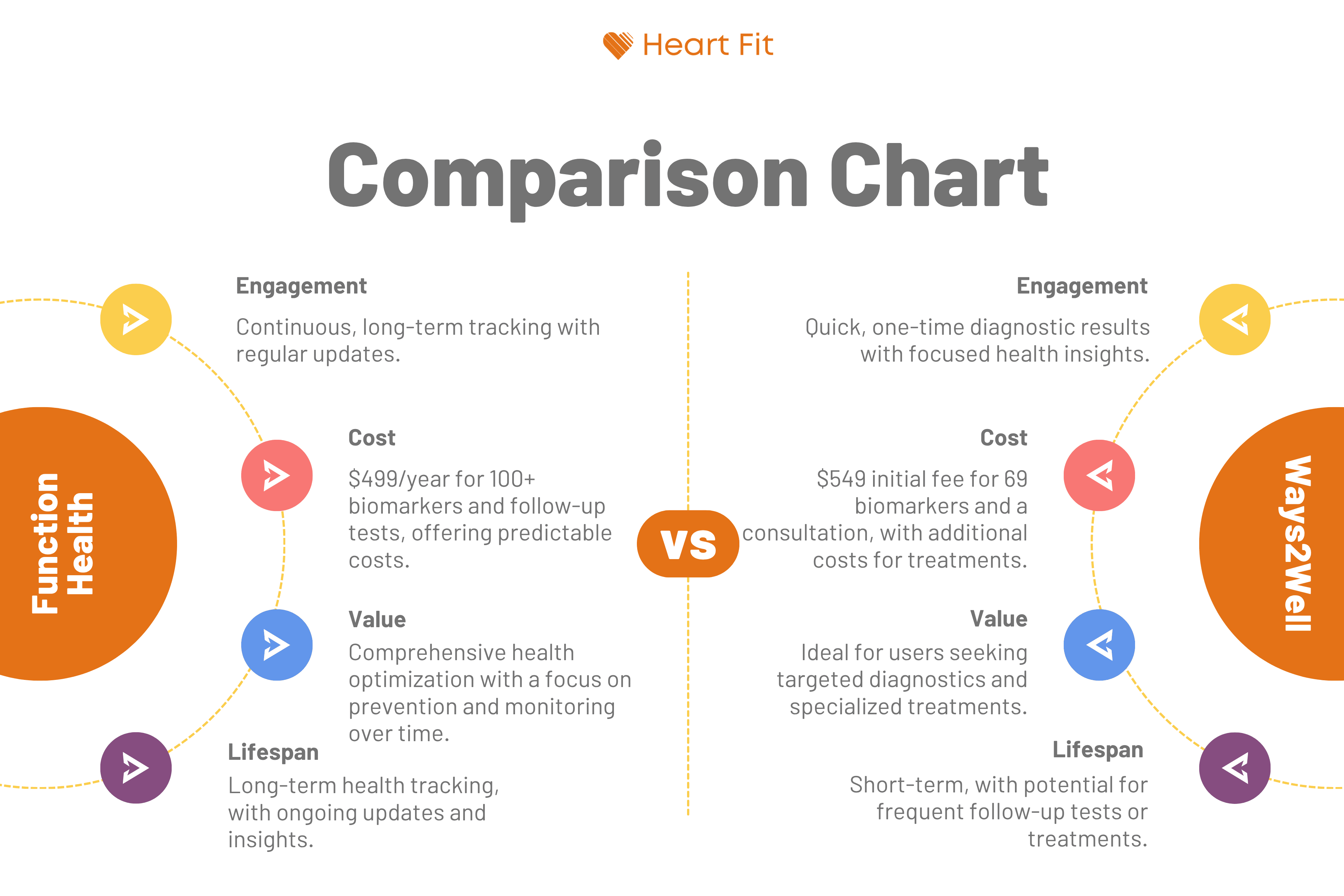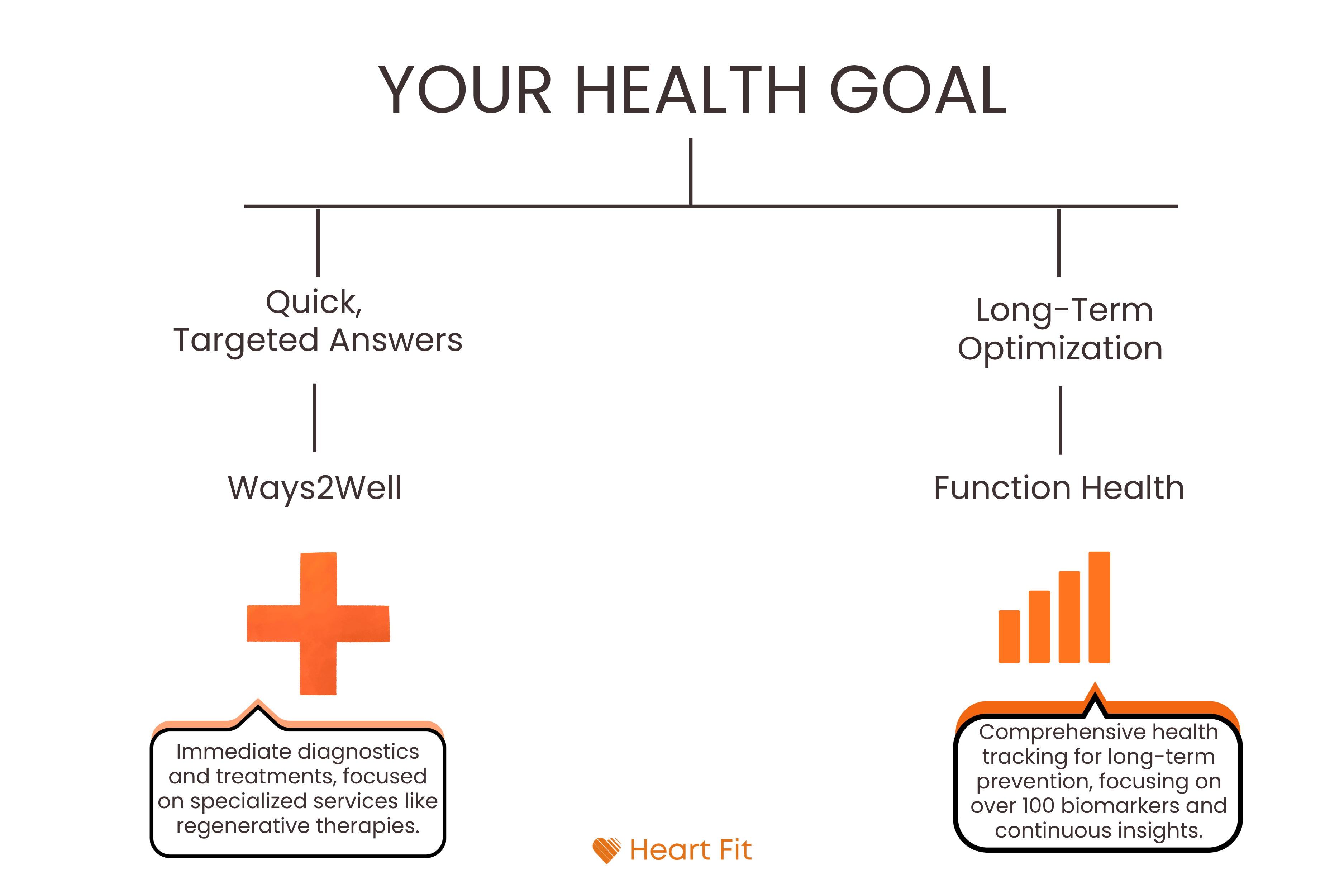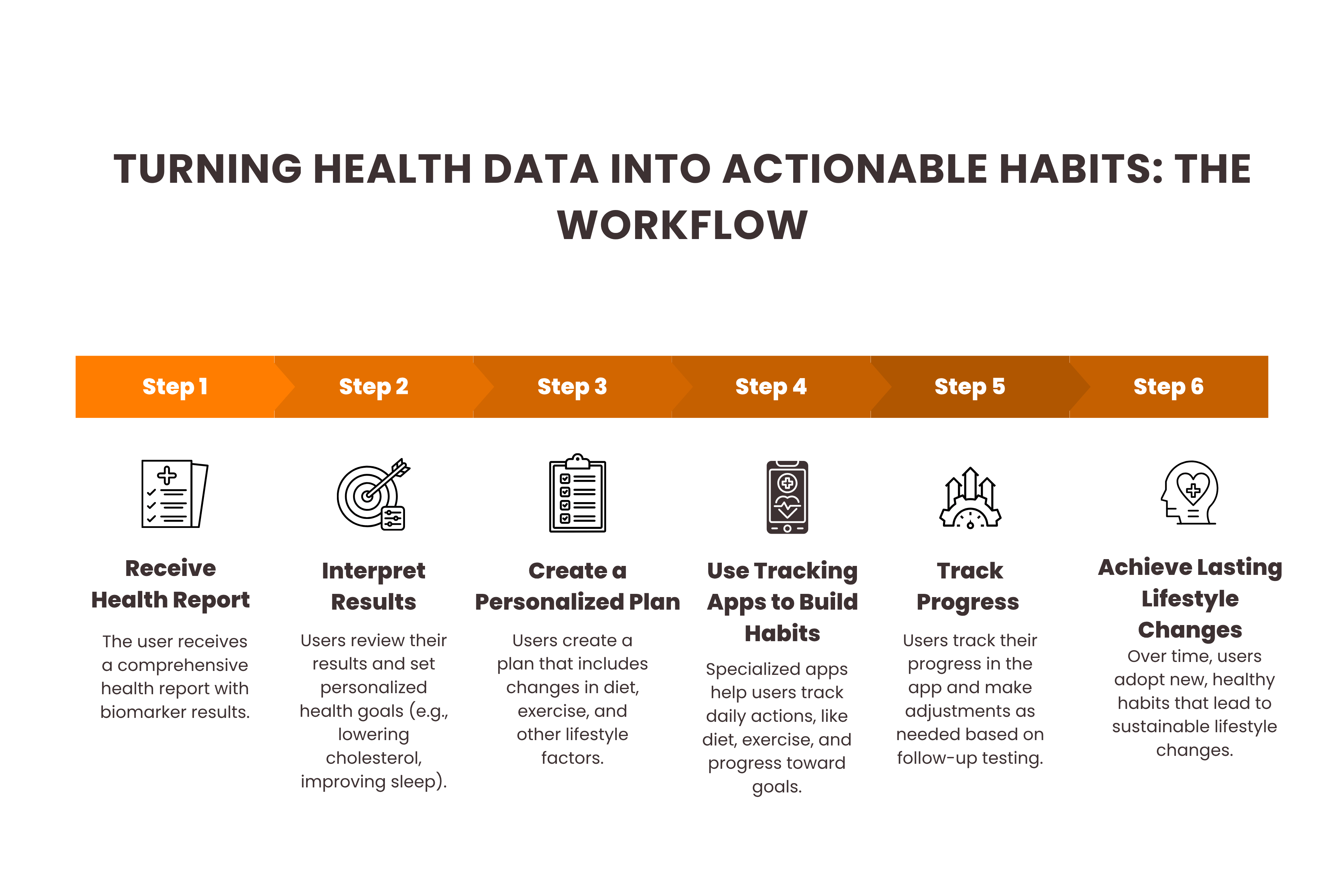Comparing Function Health vs Ways2Well cost? This guide analyzes pricing, biomarker tests, and long-term value to help you choose the right service.

When you start looking at services like Function Health and Ways2Well, the first thing you notice is the price tag, but the real story is in how they structure their costs and what you get for your money. The fundamental difference is this: Function Health operates on a clear, single annual membership fee that covers a massive amount of ongoing testing. In contrast, Ways2Well has a slightly higher initial cost that buys you a more targeted panel and a direct line to a clinical consultation focused on specialized treatments.
Disclaimer: This article is for informational purposes only and is not a substitute for professional medical advice, diagnosis, or treatment. Please consult a healthcare provider before making any lifestyle or medication changes.
We're in the middle of a major shift in how we think about health, moving away from just treating sickness to proactively staying well. This is largely possible because we can now get a detailed look at what's happening inside our bodies. Companies like Function Health and Ways2Well are leading this charge, but they approach it from different angles.
This guide isn't just about comparing dollar for dollar. It’s about understanding the true value behind each service. To really get the cost of Function Health vs Ways2Well, you have to look at what they’re trying to achieve. One is built for comprehensive, long-term health tracking to catch problems before they start. The other offers a more direct path for those who want specialized, regenerative medicine.
Before we get into a line-by-line cost breakdown, it’s crucial to understand what each platform is built for. Function Health is for the person who wants the full picture of their health over time, spotting trends to sidestep future issues. On the other hand, Ways2Well is often the choice for people with specific health goals or an interest in advanced options like hormone therapy or regenerative treatments.
To see how Function Health’s data-first model stacks up against another popular tracking platform, you might find our Function Health vs. InsideTracker pricing guide useful.
Function Health keeps things incredibly simple with its $499 annual membership. This single payment gets you over 100 lab tests right at the beginning, followed by more than 60 follow-up tests every 3–6 months. Their model is designed to be straightforward—no surprise bills, no insurance headaches—and it’s also HSA/FSA eligible.

Here’s a quick summary of how they differ.
When you boil it down, the two services are designed for different journeys. Function Health is about building a long-term, data-rich picture of your health, while Ways2Well is structured to provide targeted diagnostics that lead directly to a treatment plan.
Feature Function Health Ways2Well Primary Focus Comprehensive, long-term biomarker tracking for prevention. Targeted diagnostics leading to specialized treatments. Initial Cost $499 annual membership. $549 initial fee. What's Included 100+ biomarker tests, plus 60+ follow-up tests. 69 biomarker tests and a clinical consultation. Billing Model Annual subscription. Initial fee plus potential costs for follow-up services.
Ultimately, choosing between them comes down to whether you're looking for continuous, preventative monitoring or a more immediate, treatment-focused approach.
When you start comparing the costs of Function Health vs. Ways2Well, it’s easy to get fixated on the initial sticker price. But to really understand what you're paying for, you have to look at how each company structures its entire financial and service model. They're built for very different purposes, and that's reflected in every dollar you spend.
Function Health keeps things straightforward with a single $499 annual membership fee. That price is designed to be predictable. It covers an impressive panel of over 100 biomarkers, giving you a deep look into everything from advanced cardiac markers like ApoB (a key protein that carries cholesterol in the blood) to your metabolic health, hormone levels, and crucial nutrient statuses. The entire model is built for consistent, long-term health tracking.
Ways2Well comes in with a slightly higher initial cost of $549. For that price, you get a more focused panel of 69 biomarkers along with a clinical consultation. Their approach isn't really about broad, year-over-year monitoring. Instead, it's designed as a direct on-ramp to their specialized services, like regenerative therapies or advanced cancer screenings.

The fundamental difference is right there in the initial offer. Function Health is giving you a massive amount of data to build a personal health baseline, letting you spot subtle shifts over time. Ways2Well, on the other hand, is offering a diagnostic starting point that’s meant to guide you toward specific, often high-tech, medical treatments.
You can see Function Health's emphasis on sheer testing volume versus Ways2Well's more targeted panel, which bakes the cost of a clinical consult right into the entry price.
Let's organize the key financial and service details side-by-side to make the comparison even clearer.
This table breaks down exactly what you get for your money, from the initial fee to potential ongoing expenses and core service offerings.
Cost Component Function HealthWays2Well Initial Membership Fee $499 annually $549 one-time for initial tests & consult What's Included 100+ biomarker tests, health insights, action plans 69 biomarker tests, clinical consultation Ongoing Costs Fixed $499/year for standard testing Variable; additional costs for treatments, therapies, follow-up tests Billing Model Annual subscription A la carte; pay-per-service after initial fee Primary Goal Long-term health monitoring & optimization Direct path to specialized & regenerative treatments
In short: Function Health offers cost predictability for ongoing monitoring, while Ways2Well is an entry point to a wider, but variably priced, set of clinical services.
One of the most critical factors in the Function Health vs. Ways2Well cost debate is what happens after that first payment. Function Health’s model is completely predictable. You pay your $499 each year and you know exactly what you're getting. If you decide to add optional tests, the pricing is clear and upfront.
Ways2Well's model can be a different story. The $549 gets you in the door with that first round of tests and a consultation, but any treatments, therapies, or follow-up labs will cost extra. While this pay-as-you-go approach makes sense for someone seeking a specific intervention, it can easily lead to a much higher total cost over the long run.
One of the most significant differentiators is the potential for ongoing, variable costs with Ways2Well, whereas Function Health’s model is built around a fixed annual fee for its core testing services. This makes long-term financial planning simpler for Function Health members.
Because Ways2Well functions as a regenerative care center, that initial fee is really just the beginning. The 69-biomar ker panel is solid, but the pricing for services beyond that can feel a bit murky, which is a real consideration if you're trying to budget your health expenses for the year.
Ultimately, your choice boils down to your goals. If your aim is to build a comprehensive health baseline that you can track over several years, Function Health's predictable cost structure is hard to beat. But if you have an immediate need for specialized regenerative treatments and are prepared for variable follow-up costs, Ways2Well provides a more direct path. For a deeper look into how Function Health’s model compares with other services, you can check out our detailed review of Function Health vs. Mito Health.
Deciding between Function Health and Ways2Well is more than comparing price tags. It’s about matching a program to how you think about wellness—whether you’re all about prevention or focused on a specific medical concern.
Once you clarify your main objective—fine-tuning every metric or diving straight into advanced treatment—the “function health vs ways2well cost” comparison falls into place.

This decision typically splits into two user profiles, each with its own goals and expectations for the journey ahead.
If you love digging into numbers, spotting trends, and believe in preventing issues before they arise, Function Health is built for you. It treats your body like a complex system to be optimized over time.
Consider a real-world example:
This approach aligns with recommendations from the American Heart Association on early cholesterol management.
On the other hand, if your priority is immediate, specialized care—like regenerative therapies or advanced diagnostics—Ways2Well lays out a clear clinical path. It’s designed as a direct gateway to the treatments you need now.
For individuals seeking interventions such as stem cell therapy or targeted diagnostics, Ways2Well provides a more direct clinical pathway than a broad-based monitoring service.
Here’s how it plays out:
Ultimately, your choice boils down to motivation. Function Health represents an investment in a long-term, data-rich wellness strategy. Ways2Well, by contrast, puts you on a fast track to advanced medical care when you need it most.
Disclaimer: This article is for informational purposes only. It is not a substitute for professional medical advice, diagnosis, or treatment. Always seek the advice of your physician or other qualified health provider with any questions you may have regarding a medical condition.
When you’re weighing the Function Health vs Ways2Well cost, it's easy to get stuck on the upfront price tag. But this isn't just a purchase; it's an investment in your future self. To really understand the value, you have to look past the initial bill and consider the long-term return on your health.
Function Health is playing the long game. Its real power is in prevention. By tracking over 100 biomarkers year after year, it gives you an evolving, incredibly detailed map of what’s happening inside your body. This lets you catch subtle downward trends long before they snowball into full-blown chronic diseases.
This isn't just a hunch; it's a core principle of modern medicine. The Centers for Disease Control and Prevention (CDC) emphasizes that preventing chronic illness is one of the most effective ways to improve health outcomes and reduce healthcare costs. Think about it: spending $499 a year to catch a rising ApoB level (a key marker for heart disease risk) could potentially avoid significant medical expenses—and improve quality of life—down the road.
Ways2Well defines its return on investment completely differently. Its value isn't in broad, preventative screening but in direct access to specialized regenerative medicine and advanced diagnostics that are often walled off in the traditional healthcare system. You go to Ways2Well for targeted, immediate solutions to problems you're facing now.
Here’s the bottom line financially: Function Health’s value is in potentially preventing future costs by monitoring everything closely. Ways2Well’s value is in providing a direct line to interventions for current health issues, which justifies its higher and more variable costs.
If your primary goal is to tackle something specific, like using stem cell therapy for a degenerating joint or getting an advanced cancer screening that your doctor won't order, Ways2Well is your direct route. That initial $549 fee is simply the price of admission to that world of cutting-edge care.
So, how do you choose? It really boils down to your personal health philosophy.
Function Health’s predictable annual fee is an investment in building a long-term dataset for prevention. On the other hand, Ways2Well’s pay-as-you-go model is an investment in immediate access to specialized treatments.
Try thinking about this cost not as an expense, but as a strategic asset for your future well-being. Whether you’re trying to head off illness before it starts or treat something that’s already here, both platforms offer a clear return on investment—they’re just built for two very different approaches to health.
Disclaimer: This article is for informational purposes only and is not a substitute for professional medical advice. Always consult with a qualified healthcare provider before making any changes to your lifestyle or medical regimen.

Getting a detailed report from a service like Function Health feels like a huge win, but it's really just the starting line. The true test—and where the real value comes from—is turning all that complex health data into consistent, daily actions. This is often where things fall apart. A year is a long time, and it's tough to stay motivated without a clear way to track your progress.
When you're weighing the total function health vs ways2well cost, you have to think about what comes after you get the results. That next step, where you turn your personalized plan into lasting lifestyle changes, is absolutely crucial. And that's exactly the gap that specialized tracking apps are built to close.
Knowing you need to lower your LDL cholesterol—the "bad" kind—is one thing. Actually doing it, day in and day out, is another challenge entirely. This is where a dedicated habit-building tool becomes invaluable for getting the most out of your initial investment.
When it comes to habit and tracking apps, here are some top choices:
The biggest hurdle in proactive health isn't getting the data; it's consistently acting on it. Tools that simplify this process are essential for turning a one-time test into a long-term wellness strategy.
Using an app like HeartFit gives you a structured, affordable way to build the habits that directly address your biomarker results. Whether your goal is to boost your cardiovascular fitness or switch to a heart-healthy diet, it provides a clear roadmap.
Here’s how it works:
This approach lines up perfectly with guidance from organizations like the American Heart Association, which stresses that small, consistent dietary changes are the bedrock of managing heart health. By using an app to reinforce these habits, you make sure your journey to better health is built on a foundation of daily action, not just annual data points.
When you start digging into proactive health testing, a lot of practical questions pop up. Let's tackle some of the most common ones about Function Health and Ways2Well—covering cost, insurance, and what to expect—so you can feel confident in your decision.
Function Health offers a straightforward pricing model with a $499 annual membership fee. This covers over 100 biomarker tests and includes follow-up tests every 3-6 months. The annual membership is designed for long-term health tracking and is HSA/FSA eligible, making it a predictable, all-inclusive pricing structure for those seeking comprehensive health monitoring.
Way2Well has an initial cost of $549 for its initial round of 69 biomarker tests and a clinical consultation. After the initial fee, follow-up services, treatments, or additional diagnostic tests are available on a pay-per-service basis. The cost can vary depending on the additional treatments or therapies you choose, making it a more flexible, but sometimes unpredictable, cost model compared to Function Health's all-inclusive fee.
Function Health faces competition from several other health tracking and testing services that provide similar offerings for health monitoring, such as:
These services, like Function Health, aim to give users a deeper understanding of their health through various biomarker tests.
The main difference between Quest Health and Function Health lies in the purpose and model of their services. Quest Health (via Quest Diagnostics) offers a variety of diagnostic lab tests with the option to consult a physician based on the results. It’s typically a more traditional healthcare model.
On the other hand, Function Health provides a comprehensive, ongoing health tracking service. With Function Health, you get over 100 biomarkers tested annually, with regular follow-up testing every 3-6 months. The service is built for proactive health monitoring, focusing on detecting potential health issues before they become major problems, whereas Quest Health offers more individualized, reactive testing based on specific concerns.
Straight to the point: neither of these platforms works like your typical doctor's office when it comes to insurance.
Function Health is very clear about this. Their $499 annual fee is an out-of-pocket cost, a model designed specifically to avoid the red tape of insurance. The good news is that the membership fee is often eligible for HSA/FSA reimbursement, so you might be able to use those pre-tax dollars.
Ways2Well follows a similar path. You'll pay their $549 initial fee directly. While they don’t bill insurance for their membership or specialized therapies, it's worth asking your provider if they might reimburse you for some of the lab tests. Just know this isn't a sure thing.
Both services make getting your blood drawn pretty convenient by using major national labs. You won't have to chase down a doctor for a lab order.
The big takeaway here is that both platforms make it easy to get comprehensive lab work done on your own terms. Just be prepared for a slightly bigger time commitment upfront with Function Health's more exhaustive testing.
A normal resting heart rate for most adults is between 60 and 100 beats per minute (bpm). According to the Mayo Clinic, a lower resting heart rate often implies more efficient heart function and better cardiovascular fitness. However, factors like age, medication, and activity level can influence it. Always discuss your heart rate with a healthcare provider.
This is a big one, and rightly so. Both companies take data privacy seriously. They use robust, industry-standard security measures to protect your health information, keeping everything compliant. Your results live in a secure, private dashboard that only you can access.
It’s always a smart move to read the privacy policy of any health service you’re considering. It'll give you the full picture of exactly how your data is being managed and protected.
No, and this is a really important distinction. Neither Function Health nor Ways2Well is designed to replace your primary care physician (PCP). Think of them as tools for prevention and information, not primary care.
Health authorities like the National Institutes of Health (NIH) emphasize that a PCP is crucial for managing your overall health, diagnosing issues, and coordinating your care. The best approach is to share the results from these platforms with your doctor. That way, you can build a collaborative health plan together. For more info on how to blend new health tools with traditional medicine, check out these frequently asked questions about health apps and services.
This article is for informational purposes only and is not a substitute for professional medical advice. Always consult a healthcare provider before making any changes to your lifestyle or medical regimen.